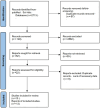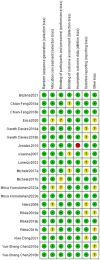Efficacy of probiotics in the treatment of allergic diseases: a meta-analysis
- PMID: 40104820
- PMCID: PMC11913692
- DOI: 10.3389/fnut.2025.1502390
Efficacy of probiotics in the treatment of allergic diseases: a meta-analysis
Abstract
Background information: Allergic diseases are an increasingly serious health issue worldwide, affecting not only the physiological health of patients but also significantly reducing their quality of life, thereby imposing a substantial economic burden on families and society. According to data from the World Health Organization, the incidence of allergic diseases has risen markedly over the past few decades, particularly among children and adolescents, making it a significant public health challenge. Although several clinical studies have explored the effects of probiotics in the treatment of food-induced allergies and allergic diseases, the results have been inconsistent. Some studies indicate positive effects, while others fail to demonstrate their efficacy. Therefore, a systematic evaluation of the effectiveness of probiotics in allergic diseases is particularly important. Some studies indicate that patients with food allergies may also experience respiratory symptoms, and certain foods may be associated with the onset or exacerbation of allergic rhinitis and asthma. Diseases such as allergic rhinitis, asthma, and atopic dermatitis are characterized by inappropriate immune responses to typically harmless environmental allergens. The incidence of these diseases is continuously rising in urban populations, prompting researchers to extensively explore novel therapeutic strategies that can effectively modulate immune responses.
Objective: The aim of this study is to systematically assess the effectiveness of probiotics in the treatment of allergic diseases. By integrating the results of existing clinical studies, we hope to provide a clearer scientific basis for the treatment of allergic diseases.
Methods: We conducted a comprehensive literature search in databases such as PubMed for articles published before the end of 2023 that evaluated the effectiveness of probiotics in treating allergic diseases. Inclusion criteria focused on studies reporting binary outcomes related to the efficacy of probiotics in patients with food allergies, asthma, allergic rhinitis, or atopic dermatitis. Data were collected using Excel software, and the Review Manager software was used to analyze the collected binary variable data. The effectiveness of probiotics was assessed by calculating the risk ratio (RR) and its 95% confidence interval (CI). Heterogeneity among studies was evaluated using the I2 statistic, and publication bias was assessed through funnel plots.
Results: The analysis of the aggregated binary data indicates that probiotics significantly improve clinical outcomes in patients with allergic diseases. Additional analysis using continuous variables (scores) further demonstrates the effectiveness of probiotics in alleviating allergic diseases. Subgroup analyses show that probiotics are effective in treating various common conditions, with two specific probiotics strains being particularly effective for allergic diseases.
Conclusion: We included literature involving pediatric patients with common allergic diseases, Probiotics can help treat allergic diseases by modulating immune mechanisms, but allergic diseases are typically caused by multiple factors and individual variations, however, allergic diseases are typically caused by multiple factors and individual variations, so they should not be used as the sole treatment method.This meta-analysis provides evidence supporting the effectiveness of probiotics in various allergic diseases. The findings suggest that probiotics can serve as a beneficial adjunctive therapy for the treatment of these conditions.
Systematic review registration: https://clinicaltrials.gov/, CRD42024586317.
Keywords: allergic diseases; asthma; eczema; probiotics; rhinitis.
Copyright © 2025 Xi, Fenglin, Yun and Chunrong.
Conflict of interest statement
The authors declare that the research was conducted in the absence of any commercial or financial relationships that could be construed as a potential conflict of interest.
Figures











References
-
- Shin YH, Hwang J, Kwon R, Lee SW, Kim MS, Shin JI, et al. . Global, regional, and national burden of allergic disorders and their risk factors in 204 countries and territories, from 1990 to 2019: a systematic analysis for the global burden of Disease study 2019. Allergy. (2023) 78:2232–54. doi: 10.1111/all.15807, PMID: - DOI - PMC - PubMed
Publication types
LinkOut - more resources
Full Text Sources
Miscellaneous

